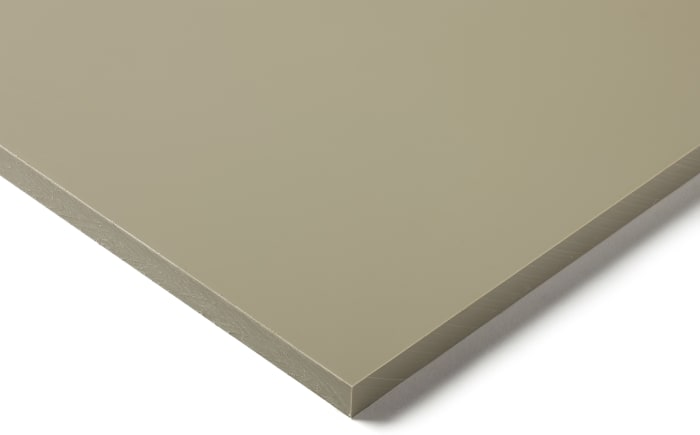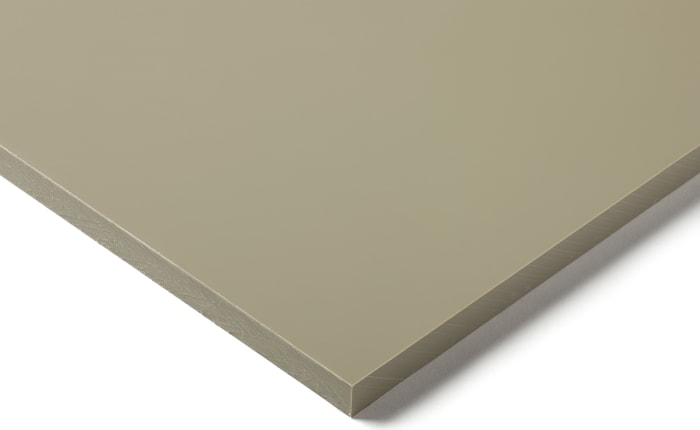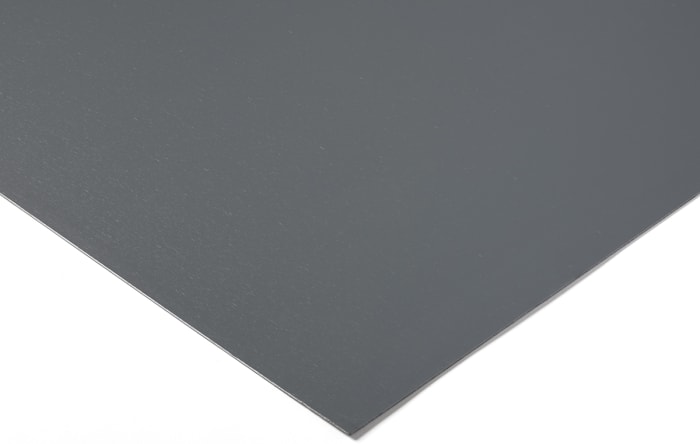RS PRO Beige Plastic Sheet, 1000mm x 500mm x 20mm

Technical documents
Specifications
Brand
RS ProColour
Beige
Form
Full
Length
1000mm
Width
500mm
Thickness
20mm
Material
PP
Laminated
No
Tensile Strength
35 MPa
Hardness
80 Ball Indentation
Flammability Rating
UL 94 HB
Water Absorption
0.03%
Maximum Operating Temperature
+80°C
Elongation
65%
Country of Origin
Germany
Product details
RS Pro Polypropylene Solid Plastic Sheets. PP Sheet : Polypropylene
From RS Pro a range of high-quality Polypropylene solid plastic sheets available in a range of sizes and thicknesses.
What are Solid Plastic Sheets?
Solid plastic sheets are sheets of strong durable plastic or plastic like materials which are cut to size and sold in a wide range of sizes and thickness. These hard plastic sheets, once purchased, can then be cut or machined into components for the fabrication of products for use in a wide range of industries. Different plastics have different properties which lend them for use in specific applications
What is Polypropylene?
Polypropylene is also known as PP is a semi-crystalline lightweight but tough thermoplastic and belongs to a group of polymers known as polyolefins. This type of polypropylene is a Polypropylene Homopolymer (PP-H) with high purity which means it is made without any anti-oxidants, pigments or other foreign substances added to it. This eliminates the potential for contamination making this material ideal for use in the food processing, medical and water treatment industry. Polypropylene (PP) has a range of other well balanced properties including excellent chemical resistance, low water absorption and good electrical insulating properties. Polypropylene does have a couple of disadvantages in that it become brittle at low temperatures and has a high thermal expansion (changes shape in high temperatures). This limits the use of polypropylene in high temperature or low temperature applications
Features and Benefits
• Excellent chemical resistance to dilute acids, cleaning agents and many solvents
• Excellent stiffness and impact strength
• Good fatigue resistance and will retain shape after a lot of bending and flexing
• Lightweight and flexible
• High purity for reduction in contamination
• Very low water absorption
• No stress crack formation
• Very good electrical insulation
• Difficult to bond but easily welded
Applications
Polypropylene sheet is used in both household and industrial applications. Its unique qualities including its light weight, impact resistance, flexibility and excellent chemical resistance make it suitable for use in a wide range of industries.The high purity of polypropylene makes it especially suited for use in the food processing, water treatment and medical industry. Other industries include mechanical, electrical, chemical and agricultural industries. Polypropylene solid plastic sheet can be used in a wide range of applications that require a lightweight but tough and flexible plastic. With its excellent resistance to fatigue, polypropylene is often used to make living hinges. Living hinges are thin pieces of plastic that bend without breaking such as the lid on a bottle of ketchup or shampoo. Other applications include the following;
• Large-size chemistry devices and chemical apparatus
• Seals
• Transport boxes for food and fittings
• Medical trays and handles
• Body contact plates for mammography
• Insulators
• Ventilation ducts
• Pallets
• Drip pans and acid and chemical tanks
• Industrial chopping boards
• Packaging for consumer products
Questions and Answers
What tools can be used to cut this plastic sheet?
The choice of tools used to cut this plastic depend on the thickness of the sheet being cut. Thin sheets of plastic can be cut using a sharp utility knife. Thicker sheets can be cut using a range of different types of saw such as a fine toothed hand saw or hacksaw or an electric table saw, band saw, circular saw or jig saw. The teeth on the saw blade should be well sharpened and evenly spaced out with a uniform height and shape to avoid cracking or chipping the plastic. The friction caused by sawing can cause the blade to heat which can melt the plastic therefore using a ’no-melt’ blade is recommended. If using a regular blade, it is an idea to pause between cuts to allow the blade to cool.
€ 180.43
€ 180.43 1 Lot of 1 (ex VAT)
1
€ 180.43
€ 180.43 1 Lot of 1 (ex VAT)
Stock information temporarily unavailable.
1
Stock information temporarily unavailable.
| quantity | Unit price |
|---|---|
| 1 - 2 | € 180.43 |
| 3 - 9 | € 170.50 |
| 10 - 29 | € 163.89 |
| 30+ | € 151.35 |
Technical documents
Specifications
Brand
RS ProColour
Beige
Form
Full
Length
1000mm
Width
500mm
Thickness
20mm
Material
PP
Laminated
No
Tensile Strength
35 MPa
Hardness
80 Ball Indentation
Flammability Rating
UL 94 HB
Water Absorption
0.03%
Maximum Operating Temperature
+80°C
Elongation
65%
Country of Origin
Germany
Product details
RS Pro Polypropylene Solid Plastic Sheets. PP Sheet : Polypropylene
From RS Pro a range of high-quality Polypropylene solid plastic sheets available in a range of sizes and thicknesses.
What are Solid Plastic Sheets?
Solid plastic sheets are sheets of strong durable plastic or plastic like materials which are cut to size and sold in a wide range of sizes and thickness. These hard plastic sheets, once purchased, can then be cut or machined into components for the fabrication of products for use in a wide range of industries. Different plastics have different properties which lend them for use in specific applications
What is Polypropylene?
Polypropylene is also known as PP is a semi-crystalline lightweight but tough thermoplastic and belongs to a group of polymers known as polyolefins. This type of polypropylene is a Polypropylene Homopolymer (PP-H) with high purity which means it is made without any anti-oxidants, pigments or other foreign substances added to it. This eliminates the potential for contamination making this material ideal for use in the food processing, medical and water treatment industry. Polypropylene (PP) has a range of other well balanced properties including excellent chemical resistance, low water absorption and good electrical insulating properties. Polypropylene does have a couple of disadvantages in that it become brittle at low temperatures and has a high thermal expansion (changes shape in high temperatures). This limits the use of polypropylene in high temperature or low temperature applications
Features and Benefits
• Excellent chemical resistance to dilute acids, cleaning agents and many solvents
• Excellent stiffness and impact strength
• Good fatigue resistance and will retain shape after a lot of bending and flexing
• Lightweight and flexible
• High purity for reduction in contamination
• Very low water absorption
• No stress crack formation
• Very good electrical insulation
• Difficult to bond but easily welded
Applications
Polypropylene sheet is used in both household and industrial applications. Its unique qualities including its light weight, impact resistance, flexibility and excellent chemical resistance make it suitable for use in a wide range of industries.The high purity of polypropylene makes it especially suited for use in the food processing, water treatment and medical industry. Other industries include mechanical, electrical, chemical and agricultural industries. Polypropylene solid plastic sheet can be used in a wide range of applications that require a lightweight but tough and flexible plastic. With its excellent resistance to fatigue, polypropylene is often used to make living hinges. Living hinges are thin pieces of plastic that bend without breaking such as the lid on a bottle of ketchup or shampoo. Other applications include the following;
• Large-size chemistry devices and chemical apparatus
• Seals
• Transport boxes for food and fittings
• Medical trays and handles
• Body contact plates for mammography
• Insulators
• Ventilation ducts
• Pallets
• Drip pans and acid and chemical tanks
• Industrial chopping boards
• Packaging for consumer products
Questions and Answers
What tools can be used to cut this plastic sheet?
The choice of tools used to cut this plastic depend on the thickness of the sheet being cut. Thin sheets of plastic can be cut using a sharp utility knife. Thicker sheets can be cut using a range of different types of saw such as a fine toothed hand saw or hacksaw or an electric table saw, band saw, circular saw or jig saw. The teeth on the saw blade should be well sharpened and evenly spaced out with a uniform height and shape to avoid cracking or chipping the plastic. The friction caused by sawing can cause the blade to heat which can melt the plastic therefore using a ’no-melt’ blade is recommended. If using a regular blade, it is an idea to pause between cuts to allow the blade to cool.




